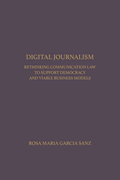Digital Journalism : Rethinking Communications Law To Support Democracy and Viable Business Models
Licenciatura en Derecho (Graduated in Law); UNED Law School, Madrid 1995; Licenciatura Comunicación. F. CCII (Graduated in Communication); University Complutense o Facultad CII, Madrid 1985; Doctorate in Communication. University Complutense. Cum Laude (1987); LLM in Transnational Business. University of the Pacific. McGeorge School of Law (2001-2002) Full professor,Law faculty,Universidad Complutense, Madrid/Research Group member NYU Information Law Inst.

With a commendatory preface by Professor Manuel Desantes Real, Law Faculty, University of Alicante, Spain
"While studying this splendid research monograph our common academic roots let me unhesitatingly identify a sound methodology, a coherent problem-solution approach, and, above all, an open spirit able to visualize a coherent proposal for a differentiated legal regime for digital news anchored in a new value: the user, reader or consumer is the holder of the right of information and expression on the Internet. Rosa Garcia Sanz enjoys a profound understanding of the new opportunities provided by digital technologies, and truly believes that the time has come to confront her proposals with the readers. And I do agree with her.
Finally, I can assure those scholars, practitioners and students who approach this book will not leave it disappointed." Manuel Desantes Real
This legal research monograph takes as its subject media/journalism law and specifically investigates new business models for journalism on the Internet and how legal perspective can lead to new business models.
Journalism is in a state of crisis. On the Internet all information is free but the producers of news cannot do it for free. And news piracy is rampant. In this context, this book presents all the pertinent case law to address “the digital journalism crisis” in order to help shape profitable business models for journalism. In this examination, a “legal framework” is provided from which it becomes possible to build a “new journalism model” and then a “news business model” in the digital era.
However, it is not enough just to ensure revenues for newspapers. A profitable news business is necessary to protect Democracy and its principles, rights and liberties. Here Professor Garcia is proposing a framework from which it is possible to strike a balance between these two goals.
Through the use of pertinent case law as a departure point, the different models of producing information and news on the Internet are identified and then its different legal elements. By focusing on the different involved rights, the study describes how the harmony of these rights are often broken and then offers an integrated solution balancing these fundamental rights in a new legal conception of news websites. While other books are focused only on one of these rights and provide a limited perspective (or the opposite, very broad and general), here the rights involved are considered altogether in order to provide a specific legal framework for the solution of the digital news crisis.
The necessity to think about a new model for the production of news—from a legal point of view—comes from the importance in a democratic system of information that serves the public interest. Although the study of the economics of this subject plays a very important role, the legal perspective is absolutely necessary from the moment the legal parameters are established, since they force the rethinking of the business models and the redefining of the business strategies. Copyrights, personal data protection and privacy along with the right of freedom of expression and information have a huge impact not only individually but also collectively because all of them are applied on the same object at the same time: news or information. To rethink the business models means also to rethink the journalistic model (“the news product”), since it doesn’t seem possible to produce an insight into one without the other. In other words, the main goal is providing basic legal “tools” to develop potential new business models.
The final goal of this work provides from a legal point of view a way to design a model of rights, which support new business models in the digital environment. This is not about proposing a specific business model, but to rethink about rights implicated in the production of news on the Internet, which can be helpful for business models capable of producing the necessary information with enough quality to maintain a democratic society.
This study provides an innovative way of looking at the question: WHAT IS THE VALUE OF DIGITAL NEWS FOR POSSIBLE BUSINESS MODELS?
This idea of value comes from links and clicks joined to the necessity of rethinking the principle of public interest in information and its different levels of scrutiny depending on every context of the Internet. The right of information and expression has to be “reshaped at the expense” of copyright and data protection in order to get that value because the exercise of this right needs links (copyrights) and clicks (data). The digital copyright and data protection right converge in this “reshaped new right”, providing new possibilities, especially to news websites and news business models.
ACADEMICA PRESS
1727 Massachusetts Avenue, NW, Suite 507
Washington, DC 20036
